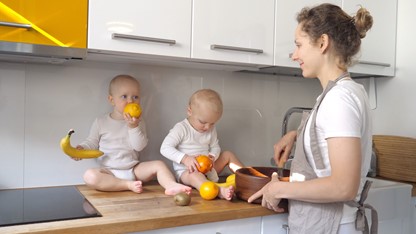4 Ways To Become A Sustainable Parent
It's without a doubt that being a parent of young ones will require you to buy many supplies- from nappies to wipes to feeding bottles to clothes and even toys. Aside from disposing of certain items, there's also the fact your kids will soon grow out of their clothes and toys. This can make things more challenging, especially if you're trying to switch to an eco-friendlier lifestyle.

To give you some ideas, here are some tips to help you become a sustainable parent:
1. Purchase Eco-Friendly Baby Toys
When looking to buy baby toys online or in local retail stores, it's often the functionality and appeal of the toy that most parents look for. For example, you'd want something colourful and enjoyable for your kids, while some parents look for something educational.
However, one of the considerations you should also look into is the toy's environmental impact. In short, the toys' material and how they have been manufactured. As much as possible, go for toys made of biodegradable natural materials such as bamboo, cotton, or renewable wood.
You may also look at the manufacturer’s environmental policy and see whether they recycle their used products or use renewable energy sources instead of fossil fuels. By doing this, you can help ensure that your child’s toys are helping protect our planet by reducing their carbon footprint.
2. Minimise Buying Excessive Baby Items
As a parent, it’s normal to want to splurge on baby items and spoil your kids. However, it’d be good to note that these items will likely not be used as much as you would like. As mentioned earlier, as your kids grow up, they’ll outgrow things like clothes and toys, which means that you will end up with a bunch of stuff you don’t need and won’t be able to use.
With that in mind, it can be helpful to only purchase items or supplies that your child will need and use for a specific period. For example, you can split your shopping trips quarterly instead of shopping for multiple baby clothes and toys at once. This way, you can consider how fast your kids grow and their toy preferences and prevent wastage.
Another alternative you can consider is to use reusable items like nappies and wipes. Raising babies and toddlers will undoubtedly require you to get more supplies. So, using disposable ones can both be costly and can cause damage to the environment, especially since they’ll end up in bins and landfills. But with reusable ones, you can throw them into a washing machine and reuse them.
On the other hand, instead of buying things, there's also the option to go down the second-hand route. With preloved items like clothes and toys, you can practice sustainability and be more cost-efficient.

3. Donate Old Items
Sustainability is more than just recycling and buying environmentally friendly products. You can also donate old baby items to charity to reduce clutter in your house while helping other people in your community.
As your child continues to grow, you can sort their things and look for items that they no longer use and need. These can be items like clothes, toys, shoes, their old stroller, or crib. If these items are still in good condition, donating them allows other people to benefit from them and reduce environmental waste.
4. Use Natural Products At Home
Using organic products can go a long way in promoting sustainability in your home. Whether you’re washing your child’s clothes or baby’s reusable nappies or caring for their hygiene, opting for natural products instead of those that may contain harmful chemicals is recommended.
When washing your children’s clothes, look for eco-friendly washing detergents. It can also help to get refillable products, so you can cut back on plastic usage and unnecessary packaging. In addition, you can also switch to products like soap, shampoo, and body wash that contain mild and organic ingredients. Aside from ensuring they are gentle on your children’s skin, you can also help the environment.
As you look for these products, read the labels to see if they contain harmful ingredients. You can also ask the store staff if they have available natural products to ensure you get what you need without compromising on quality.
Wrapping It Up
Striving to be a sustainable parent can be both exciting and challenging. You want what's best for your child, but at the same time, be an advocate for the environment. While switching to eco-friendly practices may take time and effort, it can be worthwhile.
This article listed some ways you can practice and promote sustainability in your home. As a good start, consider purchasing eco-friendly toys, avoid buying excessive baby items, donate old things, and use natural products at home.